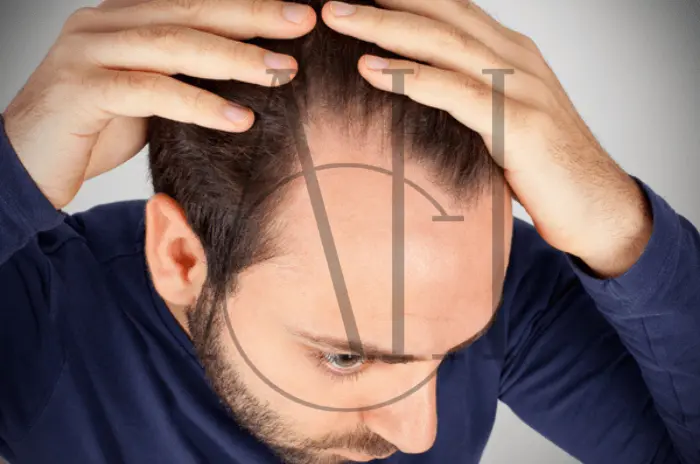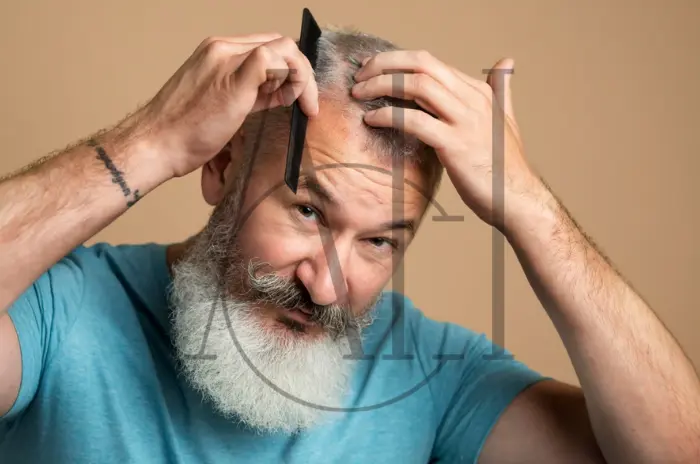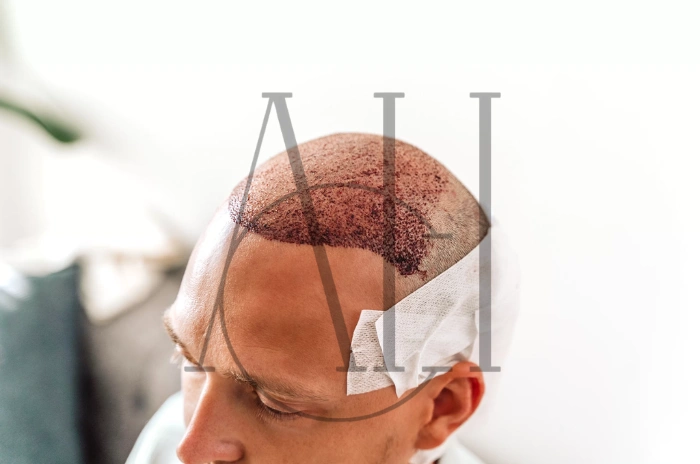Hair loss affects millions of people worldwide, driving the search for effective solutions beyond traditional treatments. Among the emerging trends in hair care, collagen supplements have gained significant attention for their potential to support hair growth and overall hair health. But does the science support these claims? As experts working with intermediary organizations in the hair restoration field, we’ve examined the research to provide you with evidence-based insights about collagen’s role in hair health.
Table of Contents
ToggleWhat Is Collagen and Why It Matters for Hair
Collagen is the most abundant protein in our bodies, making up approximately 30% of all proteins and serving as the fundamental structural framework that keeps our bodies intact. This remarkable protein acts as a crucial building block for our skin, bones, muscles, tendons, blood vessels, and countless other vital structures throughout our system. The importance of collagen extends far beyond simple structural support, playing active roles in wound healing, tissue repair, and cellular communication processes essential for maintaining optimal health.
Collagen’s Role in Building Hair Protein
Hair is primarily composed of keratin, a fibrous structural protein that shares remarkable similarities with collagen in terms of amino acid requirements and synthesis pathways. This protein constitutes approximately 95% of the hair shaft’s composition and determines many of the physical characteristics we associate with healthy hair, including strength, elasticity, and shine. Collagen provides many of the essential amino acids required for optimal keratin formation, particularly glycine, proline, and hydroxyproline, which are crucial building blocks in the complex process of hair protein synthesis.
The relationship between collagen and keratin goes beyond simple amino acid provision. Both proteins require similar cofactors and enzymatic processes for their formation, and both depend on adequate vitamin C availability for proper cross-linking and structural stability. This biochemical similarity suggests that supporting collagen synthesis through supplementation might indirectly benefit keratin production.
| Amino Acid | Collagen Content | Keratin Requirement | Function in Hair |
|---|---|---|---|
| Glycine | 33% | Moderate | Flexibility and protein folding |
| Proline | 12% | Moderate | Structural stability |
| Alanine | 11% | High | Energy metabolism support |
| Cysteine | Low | Critical | Disulfide bond formation |
How Collagen Supports Scalp Structure
The scalp’s dermis layer contains significant amounts of collagen, representing approximately 70% of the scalp’s dry weight and forming the essential structural matrix that supports optimal hair follicle function. This extensive collagen network provides crucial mechanical support for hair follicles while facilitating the complex biological processes necessary for sustained hair growth and maintenance.
This collagen framework serves several critical functions:
- Follicle Anchoring: Provides stable positioning for hair follicles throughout growth cycles
- Vascular Support: Maintains integrity of blood vessels delivering nutrients to hair roots
- Nutrient Transport: Facilitates efficient delivery of amino acids, vitamins, and minerals
- Scalp Elasticity: Maintains optimal tissue flexibility and resilience
- Barrier Function: Supports protective barriers against environmental damage
How Does Collagen Work?
Understanding how collagen functions in our body helps explain its potential benefits for hair health through complex biological mechanisms that extend from digestion to cellular utilization.
Digestion and Absorption
When you consume collagen supplements, your digestive system breaks down the collagen proteins into smaller components through a sophisticated series of biological processes. This breakdown begins immediately upon ingestion and involves several critical steps that determine how much collagen-derived material actually reaches our bloodstream and becomes available for hair-related processes.
The digestive breakdown follows this sequence:
- Stomach Phase: Gastric acid (pH 1.5-3.5) denatures collagen’s triple-helix structure
- Pepsin Action: Primary protein-digesting enzyme begins cleaving collagen into polypeptides
- Small Intestine Processing: Pancreatic enzymes continue breakdown into smaller peptides
- Active Transport: Specialized systems transport amino acids and peptides across intestinal barrier
- Bloodstream Distribution: Absorbed components enter circulation for systemic availability
From Peptides to Proteins
Once absorbed, collagen-derived amino acids and peptides become part of the body’s general amino acid pool, where they can potentially be utilized for various protein synthesis processes throughout the body. The body prioritizes the use of these amino acids based on immediate physiological needs, with essential functions taking precedence over cosmetic improvements.
Protein synthesis pathways relevant to hair health include:
- Keratin Production: Direct incorporation into hair protein synthesis
- Structural Protein Renewal: Ongoing maintenance of follicle architecture
- Enzyme Synthesis: Production of growth-regulating enzymes
- Collagen Regeneration: Supporting scalp structural integrity
How Collagen May Help Hair Growth
Research suggests several interconnected mechanisms by which collagen supplementation might support hair growth, though the evidence remains preliminary and requires further investigation.
Amino Acids That Build Keratin
Collagen provides essential building blocks needed for keratin production through its unique amino acid profile that closely aligns with the structural requirements of healthy hair formation. The process of keratin synthesis occurs within highly specialized cells called keratinocytes, located in the hair follicle’s matrix region where rapid cell division and protein production take place.
When collagen is consumed and properly digested, it releases amino acids into the body’s general amino acid pool, where they become available for hair protein synthesis. While the body prioritizes these amino acids based on immediate physiological needs, adequate collagen intake may help ensure sufficient building blocks remain available for hair-related protein synthesis.
Collagen’s Antioxidant Benefits for Follicles
Recent research has revealed that certain collagen peptides possess significant antioxidant properties that could potentially provide substantial protection for hair follicles against oxidative stress. Hair follicles rank among the most metabolically active tissues in the human body, generating significant quantities of reactive oxygen species as natural byproducts of their intense cellular activities.
Antioxidant mechanisms include:
- Free Radical Scavenging: Direct neutralization of harmful reactive oxygen species
- Metal Ion Chelation: Binding catalytic metals that promote oxidative reactions
- Enzymatic Support: Supporting synthesis of endogenous antioxidant enzymes
- Membrane Protection: Stabilizing cellular membranes against oxidative damage
The protective benefits may include prevention of premature hair aging, maintenance of healthy growth cycles, and protection of cellular machinery essential for hair production.
Types of Collagen Studied for Hair Growth
Different sources and processing methods of collagen offer varying benefits for hair health applications, with distinct characteristics that may influence their effectiveness.
Marine vs Bovine Collagen Effects
The two primary sources of collagen used in supplements exhibit important differences in composition, absorption, and potential benefits for hair health applications.
Marine Collagen Advantages:
- Superior bioavailability (up to 1.5x better absorption than bovine)
- Predominantly Type I collagen, matching human skin and scalp composition
- Lower molecular weight facilitating easier breakdown and absorption
- Higher concentrations of glycine and proline for keratin synthesis
- Environmental sustainability from fish processing byproducts
Bovine Collagen Characteristics:
- Contains both Type I and Type III collagen for broader spectrum benefits
- More extensive clinical research supporting safety and efficacy
- Generally more affordable and widely available in supplement market
- Established manufacturing processes with consistent quality standards
| Collagen Source | Bioavailability | Primary Types | Cost | Research Support |
|---|---|---|---|---|
| Marine (Fish) | High (1.5x bovine) | Type I | Higher | Moderate |
| Bovine (Cattle) | Moderate | Type I & III | Lower | Extensive |
Hydrolyzed Collagen Peptides Explained
Hydrolyzed collagen peptides represent the most bioavailable form of collagen supplementation, created through controlled enzymatic breakdown of larger collagen proteins into smaller, more easily absorbed fragments. This pre-digestion process eliminates much of the digestive work required and ensures more consistent absorption across different individuals.
Processing benefits include:
- Enhanced Bioavailability: Pre-broken peptides absorb more efficiently
- Improved Solubility: Dissolves completely in liquids without clumping
- Consistent Molecular Weight: Standardized peptide sizes for predictable absorption
- Reduced Digestive Stress: Less burden on digestive enzymes and systems
- Faster Utilization: More rapid availability for protein synthesis processes
Optimal peptide molecular weights range between 3,000-10,000 Daltons, providing the ideal balance between absorption efficiency and bioactive potential.

Scientific Evidence on Collagen and Hair Health
The current research landscape presents a complex picture with promising preliminary findings balanced against significant limitations in study design and scope.
Lab and Animal Results vs Human Studies
The evidence hierarchy for collagen and hair health demonstrates substantial gaps between controlled laboratory findings and real-world human applications.
| Study Type | Number of Studies | Quality Rating | Applicability | Hair-Specific Results |
|---|---|---|---|---|
| In Vitro | 15+ | Moderate | Limited | Promising mechanisms |
| Animal Models | 8+ | Moderate | Low | Positive but not translatable |
| Human Trials | 4-6 | Limited | High | Mixed, small samples |
| Meta-Analyses | 0 | N/A | N/A | Insufficient data |
Laboratory findings include:
- Stimulation of hair follicle cell proliferation in culture
- Enhanced keratin gene expression in treated cells
- Improved cellular antioxidant capacity
- Extended growth phase duration in follicle models
Animal study results show:
- Increased hair growth rate in treated mice
- Improved hair thickness and density
- Enhanced follicle cycling and regeneration
- Reduced hair loss in stress models
Hair Follicle Growth & Collagen Peptide Trials
The limited human studies specifically examining collagen’s effects on hair health provide important preliminary insights despite methodological limitations.
Key human studies:
Study 1 (2020): 44 women aged 45-65 with thinning hair received 10g marine collagen daily for 12 weeks, showing 13% increase in hair diameter and 31% reduction in breakage.
Study 2 (2021): 72 healthy adults supplemented with 5g bovine collagen daily for 16 weeks, reporting improved hair texture but no significant growth rate changes.
Study 3 (2022): 120 women with pattern hair loss received collagen plus vitamins versus vitamins alone for 24 weeks, with superior improvements in the combination group.
Common limitations:
- Small sample sizes limiting statistical power
- Short study durations relative to hair growth cycles
- Lack of standardized outcome measurements
- Insufficient control for confounding variables
Best Ways to Use Collagen for Your Hair
For those choosing to explore collagen supplementation, understanding optimal usage strategies can maximize potential benefits while minimizing risks.
Oral Supplements vs Topical Products
Oral Supplementation Advantages:
- Systemic distribution provides whole-body availability
- Extensive research supporting absorption and utilization
- Convenient daily administration with consistent dosing
- Multiple formulation options for individual preferences
Topical Application Limitations:
- Large molecular size prevents effective skin penetration
- Limited research supporting scalp-specific benefits
- Potential for allergic reactions or skin irritation
- Expensive relative to potential effectiveness
| Application Method | Absorption | Evidence Level | Convenience | Cost Effectiveness |
|---|---|---|---|---|
| Oral Supplements | High | Moderate | High | Good |
| Topical Creams | Very Low | Limited | Moderate | Poor |
| Scalp Serums | Low | Very Limited | Low | Poor |
Recommended Dosage and Timing
Evidence-based dosing recommendations must balance the limited research available with practical considerations for safety and effectiveness.
Dosage Guidelines:
- Beginner Dose: 2.5-5g daily for initial tolerance assessment
- Standard Dose: 5-10g daily based on most positive research outcomes
- Maximum Dose: 10-15g daily with limited additional benefit beyond this range
Timing Optimization:
- Morning Administration: Aligns with natural protein synthesis rhythms
- Empty Stomach: Reduces competition with dietary proteins for absorption
- With Vitamin C: Enhances collagen utilization and synthesis
- Consistent Schedule: Maintains steady amino acid availability
Bone Broth, Powders, and Peptides
Available Formulations:
- Collagen Powders
- Most versatile and cost-effective option
- Easy mixing into beverages and foods
- Precise dosage control and measurement
- Wide variety of flavored and unflavored options
- Capsule Forms
- Maximum convenience for busy lifestyles
- Taste-neutral with no mixing required
- Precise pre-measured dosing
- Higher cost per gram compared to powders
- Liquid Collagen
- Pre-dissolved for immediate availability
- Often enhanced with complementary nutrients
- Premium pricing with convenience factor
- May contain added sugars or preservatives
- Bone Broth Sources
- Natural collagen in traditional food form
- Variable and unpredictable collagen content
- Additional nutrients from whole food matrix
- Time-intensive preparation requirements
Risks and Side Effects of Collagen Supplements
Understanding potential risks helps ensure safe and appropriate use of collagen supplements for hair health purposes.
Ingredients & Contamination Concerns
Quality varies dramatically among collagen supplement manufacturers, making careful product selection crucial for both safety and effectiveness.
Primary Contamination Risks:
- Heavy Metals: Marine sources may contain mercury, lead, cadmium from polluted waters
- Bacterial Contamination: Poor manufacturing can introduce harmful microorganisms
- Allergenic Proteins: Cross-contamination with shellfish or other allergens
- Chemical Residues: Processing chemicals or preservatives not listed on labels
Quality Assurance Factors:
- Third-party testing for purity and potency verification
- Transparent sourcing with clear origin documentation
- GMP (Good Manufacturing Practice) certification
- Heavy metal testing with published results
- Allergen testing and clear labeling
Digestive Discomfort and Allergies
Most individuals tolerate collagen supplements well, but some may experience adverse effects, particularly when beginning supplementation.
| Side Effect | Frequency | Severity | Onset | Management Strategy |
|---|---|---|---|---|
| Digestive upset | 5-10% | Mild | 1-2 weeks | Start with lower doses |
| Bloating | 3-7% | Mild-Moderate | Days | Ensure adequate hydration |
| Nausea | 2-5% | Mild | 30-60 minutes | Take with meals |
| Allergic reactions | 1-3% | Variable | Variable | Discontinue immediately |
| Diarrhea | 1-3% | Mild-Moderate | Variable | Reduce dose, check quality |
Risk Reduction Strategies:
- Begin with 25-50% of intended dose and gradually increase
- Choose high-quality products from reputable manufacturers
- Monitor for any adverse reactions during initial weeks
- Consult healthcare providers if reactions persist

Collagen vs Other Hair Growth Solutions
Understanding how collagen compares to established hair growth treatments helps place its potential benefits in proper context.
Collagen and Minoxidil: Which to Choose
Minoxidil Advantages:
- FDA-approved with decades of clinical evidence
- Proven efficacy for androgenetic alopecia treatment
- Well-understood mechanisms of action
- Predictable response timelines and outcomes
Collagen Characteristics:
- Nutritional support approach with broader health benefits
- Limited specific evidence for hair loss treatment
- Generally safer with fewer side effects
- May complement other treatments synergistically
| Treatment | FDA Status | Evidence Quality | Efficacy | Side Effects | Cost |
|---|---|---|---|---|---|
| Minoxidil | Approved | Strong | High | Moderate | Low-Moderate |
| Finasteride | Approved | Strong | High | Moderate-High | Low |
| Collagen | Supplement | Limited | Low-Moderate | Low | Moderate |
| Biotin | Supplement | Moderate | Low-Moderate | Very Low | Low |
Nutrition, Lifestyle, and Professional Treatments
Comprehensive hair health requires addressing multiple factors beyond single supplements or medications.
Foundational Nutritional Requirements:
- Complete proteins providing all essential amino acids
- Iron for oxygen transport and cellular energy production
- Zinc supporting protein synthesis and immune function
- B-vitamins facilitating energy metabolism and protein production
- Vitamin D regulating hair follicle cycling
- Omega-3 fatty acids supporting scalp health and inflammation control
Lifestyle Optimization Strategies:
- Stress management through proven techniques like meditation and exercise
- Quality sleep supporting growth hormone release and cellular repair
- Regular physical activity improving circulation and overall health
- Avoiding smoking and excessive alcohol consumption
- Protecting hair from mechanical and chemical damage
Do Collagen Supplements Help Hair Growth
What the Science Says
Current evidence suggests modest potential benefits, but definitive conclusions require more robust research.
Skin and Wrinkle Results
Studies examining collagen’s effects on facial skin demonstrate improvements in dermal thickness, elasticity, and hydration that may indirectly benefit scalp health. Since the scalp is essentially specialized skin tissue, improvements in overall skin health could theoretically translate to better conditions for hair growth.
Nail Growth Findings
Research indicates that collagen supplementation may accelerate nail growth rates and improve nail strength. Since nails, like hair, are composed primarily of keratin proteins, these findings suggest potential parallel benefits for hair growth and strength.
Hair Health—What You Should Know
Limited direct hair studies show potential improvements in hair diameter, reduced breakage, and enhanced texture. However, comprehensive clinical trials with large sample sizes and extended durations are needed to establish definitive recommendations.
Limitations of Current Studies
Major Research Gaps:
- Insufficient sample sizes for statistical significance
- Short study durations relative to hair growth cycles
- Lack of standardized outcome measures across studies
- Limited demographic diversity in study populations
- Absence of long-term safety and efficacy data
Why Some People Still Take Collagen
Belief in Skin–Hair Benefits
Many users report subjective improvements in overall appearance and well-being that extend beyond measurable parameters. These perceived benefits often create strong personal conviction about collagen’s effectiveness, particularly when improvements coincide with supplementation periods.
Potential Gaps in Absorption
Individual variations in digestive health, genetic factors affecting protein metabolism, dietary restrictions, or increased physiological demands may create scenarios where collagen supplementation provides meaningful benefits not apparent in general population studies.
How Collagen Builds Hair
Amino Acids That Form Keratin
Collagen provides amino acids that serve as building blocks for keratin synthesis, particularly glycine, proline, and alanine. These amino acids become available through normal digestive processes and join the body’s amino acid pool for protein synthesis activities.
Collagen as a Hair Protein Source
While collagen itself isn’t directly incorporated into hair structure, its component amino acids can potentially support hair protein production when other nutritional requirements are met and metabolic processes are functioning optimally.
5 Potential Benefits of Collagen for Hair
1. Provides Amino Acids for Keratin
Collagen supplies essential building blocks needed for keratin production, potentially supporting stronger, healthier hair strands when combined with comprehensive nutrition.
2. Acts as an Antioxidant for Hair Follicles
Certain collagen peptides demonstrate antioxidant properties that may protect hair follicles from oxidative stress and environmental damage.
3. Supports Scalp Skin Health
By potentially improving overall skin health and structure, collagen may create better conditions for hair growth at the scalp level.
4. Helps Prevent Hair Thinning
Some preliminary evidence suggests collagen supplementation may help maintain hair density and prevent hair thinning, particularly the age-related kind.
5. May Slow Graying of Hair
Antioxidant effects might help protect melanocytes in hair follicles, potentially slowing the graying process, though research is very limited.
Forms of Collagen for Hair Use
Oral Supplements and Amounts
Most research supporting collagen benefits has used oral supplementation in dosages ranging from 2.5-10 grams daily, with hydrolyzed peptides showing superior absorption characteristics.
Topical Products Compared
Topical collagen products face significant challenges due to molecular size limitations and lack of research supporting scalp penetration and effectiveness.
Better Ways to Support Skin, Hair, Nails
Eat Protein and Stay Hydrated
A balanced diet providing complete proteins, adequate hydration, and essential nutrients offers superior support for hair health compared to any single supplement.
Protect Your Skin
Using sunscreen, avoiding harsh chemicals, and maintaining gentle hair care practices prevent damage that can compromise hair health.
Lifestyle Matters
Regular exercise, stress management, quality sleep, and avoiding harmful substances like smoking provide foundational support for optimal hair growth.
When to Start Taking Collagen
After Age 25
Natural collagen production begins declining around age 25, making this an appropriate time to consider supplementation for those interested in preventative care.
Consistent Use Over Time
Collagen supplementation requires consistent use over several months to see potential benefits, as hair growth cycles are long and changes occur gradually.
Food Sources That Help
Eat Bone Broth, Fish, Turkey
Natural collagen sources include bone broth from grass-fed animals, fish with skin and bones, and collagen-rich organ meats.
Add Egg Whites and Fish
Collagen-supporting foods provide amino acids and cofactors necessary for natural collagen synthesis, including egg whites, fatty fish, and vitamin C-rich fruits.
Collagen vs. Biotin – What’s the Difference?
Collagen Is a Structural Protein
Collagen functions as a structural protein providing amino acid building blocks for hair formation while supporting the scalp environment where hair growth occurs.
Biotin Is an Essential B Vitamin
Biotin represents an essential water-soluble vitamin that plays an indispensable role in hair growth through its involvement in cellular metabolism and energy production processes.
Can Collagen Supplementation Help You Avoid a Hair Transplant?
Limitations: When advanced hair loss still requires transplant solutions
Collagen supplements cannot replace hair follicles that have been permanently lost or reverse significant pattern baldness. For advanced hair loss, hair transplant procedures remain the most effective solution for restoring hair density.
Supporting Post-Transplant Results: Using collagen to maintain graft health and growth
After hair transplant procedures, collagen supplementation may support the healing process and provide nutritional support for transplanted grafts by supplying building blocks for tissue repair and hair growth.
Can Collagen Support Hair Growth After a Transplant?
Role of collagen in healing and follicle health
Post-transplant healing involves significant tissue repair and collagen synthesis. Supplementation may support this natural healing process and provide building blocks for healthy hair growth from transplanted follicles.
Combining collagen with transplant aftercare
Working with intermediary organizations, comprehensive aftercare protocols often include nutritional support alongside proven treatments to optimize transplant outcomes and long-term graft success.
FAQ
What is collagen and how does it relate to hair health?
Collagen is the most abundant protein in our bodies, providing structure to skin, bones, and other tissues. For hair health, collagen supplies amino acids needed to produce keratin (the main protein in hair) and supports the scalp’s structural integrity where hair follicles are anchored.
How might collagen supplements help with hair growth and thickness?
Collagen supplements may support hair health by providing essential amino acids for keratin synthesis, offering antioxidant protection to hair follicles, and supporting overall scalp health. Some studies suggest improvements in hair thickness and reduced breakage, though more research is needed.
Are there different types of collagen used for hair, and which is best?
The main types are marine collagen (from fish) and bovine collagen (from cattle). Marine collagen is typically more bioavailable, while bovine collagen has been more extensively studied. Hydrolyzed collagen peptides are generally preferred due to better absorption.
What does scientific evidence say about collagen and hair health?
Current scientific evidence is limited but promising. While lab and animal studies show positive results, human studies specifically focused on hair are scarce. Most evidence comes from skin health studies where hair benefits were secondary observations.
What are the best ways to take collagen for hair?
Oral supplements are most effective, typically in doses of 2.5-10 grams daily. Take on an empty stomach or with vitamin C for better absorption. Collagen peptides are preferred over whole collagen due to improved bioavailability.
Are there any risks or side effects associated with collagen supplements for hair?
Generally safe for most people, but potential side effects include digestive upset, allergic reactions (especially with marine sources), and possible contamination concerns. Choose high-quality, third-party tested products.
How does collagen compare to other popular hair growth solutions like Biotin or Minoxidil?
Minoxidil is FDA-approved with proven efficacy for pattern hair loss. Biotin is essential for hair metabolism and particularly helpful for those with deficiencies. Collagen provides structural support but lacks the clinical evidence of these other treatments.
Beyond collagen, what are other effective ways to improve overall hair health?
Focus on a balanced, protein-rich diet, manage stress levels, practice gentle hair care, protect hair from heat damage, ensure adequate sleep, and address any underlying health conditions. For significant hair loss, consult professionals for comprehensive evaluation.




